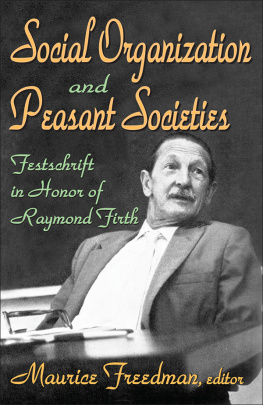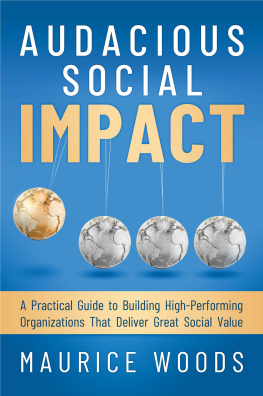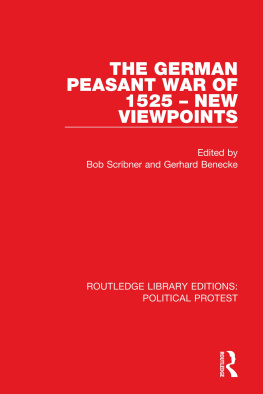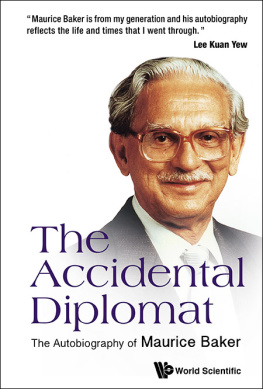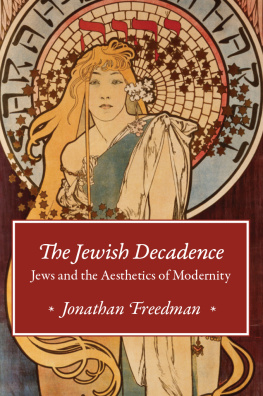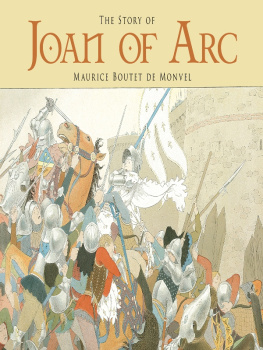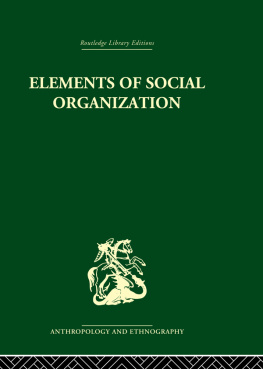Social Organization and Peasant Societies
Social Organization and Peasant Societies
Festschrift in Honor of Raymond Firth
Maurice Freedman, Editor
First published 1967 by Transaction Publishers
Published 2017 by Routledge
2 Park Square, Milton Park, Abingdon, Oxon OX14 4RN
711 Third Avenue, New York, NY 10017, USA
Routledge is an imprint of the Taylor & Francis Group, an informa business
Copyright 1967 by Maurice Freedman.
All rights reserved. No part of this book may be reprinted or reproduced or utilised in any form or by any electronic, mechanical, or other means, now known or hereafter invented, including photocopying and recording, or in any information storage or retrieval system, without permission in writing from the publishers.
Notice:
Product or corporate names may be trademarks or registered trademarks, and are used only for identification and explanation without intent to infringe.
Library of Congress Catalog Number: 2008007021
Library of Congress Cataloging-in-Publication Data
Social organization and peasant societies: festschrift in honor of Raymond
Firth / Maurice Freedman, editor.
p. cm.
Includes bibliographical references.
ISBN 978-0-202-36216-8
1. Anthropology. I. Firth, Raymond, 1901-2002. II. Freedman, Maurice.
GN29.S6 2008
306dc22 2008007021
ISBN 13: 978-0-202-36216-8 (pbk)
Contents
by Lorraine Bari, Senior Lecturer in Sociology and Anthropology, proposed University of Salford, Lanes.
by Cyril S. Belshaw, Professor of Anthropology, The University of British Columbia
by Burton Benedict, Senior Lecturer in Social Anthropology, London School of Economics and Political Science
by Anthony Forge, Lecturer in Social Anthropology, London School of Economics and Political Science
by Maurice Freedman, Professor of Anthropology, London School of Economics and Political Science
by Phyllis M. Kaberry, Reader in Anthropology, University College London
by Edmund Leach, Provost of Kings College and Reader in Social Anthropology, University of Cambridge
by Kenneth Little, Professor of Social Anthropology, University of Edinburgh
by Adrian C. Mayer, Professor of Indian Anthropology, School of Oriental and African Studies, London
by H. S. Morris, Senior Lecturer in Social Anthropology, London School of Economics and Political Science
by W. E. H. Stanner, Professor of Anthropology, The Australian National University
by M. G. Swift, Senior Lecturer in Anthropology, University of Sydney
by Barbara E. Ward, Lecturer in Asian Anthropology, School of Oriental and African Studies, London
THESE essays have been written to honour the man who taught their writers. They are about different problems within the general field of social organization; they have been composed in many styles; and they deal ethnographically with a heterogeneous collection of peoples and countries. By their variety they may serve to illustrate an important aspect of Professor Raymond Firths influence as a teacher: the range of his interests and his success in promoting social anthropological research on the broadest front. He came from Polynesia and won his first reputation by his Polynesian studies; but he has never sought to marshal his pupils to form a cohort of Oceanists. He came from economics, and made economic anthropology his own; yet he has given the least economics-minded of his pupils their head.
The breadth and the variety in the work of his students taken as a whole are a reflection of his own catholicity. From economics he moved on to reach into every corner of the field covered by social anthropology, and many of the emphases in his interests can be traced in this sample of essays. Four are on themes in kinship and marriage (by Baric, Benedict, Kaberry, and Leach). Three are on religious subjects (by Freedman, Morris, and Stanner). Two are on the study of modern social change (by Little and Mayer). One is on art (by Forge). It is altogether fitting that three essays should be devoted to subjects in economic anthropology (by Belshaw, Swift, and Ward). On all these topics Raymond Firth has himself written extensively and taught untiringly.
The Polynesian expert remains. (While this book is in press he is making his third field trip to Tikopia and other parts of the Solomons.) But he is a regional expert with a lively sense of the need for contrast; and the man who could have rested on his Tikopian laurels went on to become the foremost student of Malay society and the founder of anthropological studies of modern kinship in the country where he made his home. It is a thousand pities that no Polynesian society is dealt with in this book, for that compliment was certainly due. But at least Malaya makes its appearance (in the paper by Swift); New Guinea is represented in the essays by Forge and Kaberry, for that too, of course, is a country where Raymond Firth has worked; while Littles contribution on West Africa and Morriss on Sarawak may serve to remind us that while Raymond Firth was associated with the Colonial Social Science Research Council he made a short tour of Gambia, Sierra Leone, the Gold Coast, and Nigeria, and a visit to Sarawak. For the rest, the societies discussed in the book are scattered over a large part of the world. It is appropriate that they should be so when they are being used to demonstrate the influence of a teacher who has urged his pupils to range widely and to consider the relevance of social anthropology for the study of society in all its forms.
Raymond Firth came to the London School of Economics as a postgraduate student in 1924. He had already written his first monograph (on the kauri-gum industry) as an economist trained in New Zealand, and he arrived in Houghton Street strongly inclined to pursue his studies in economics and, as he himself puts it, do anthropology as a hobby. It will come as a surprise to the anthropological world that he planned to write his doctoral thesis on the frozen meat industry in New Zealand; and our imagination may be agreeably exercised in speculating on what his career might have been if he had not so soon taken to anthropology and anthropology to him. He had already read Malinowski on the Trobriands, was delighted to be told that the anthropologist was at the L.S.E., and within six months was on the road that led him, via the primitive economics of the New Zealand Maori, to Tikopia.
In the forty-two years that have gone by he has absented himself from the L.S.E. only during the time he has been in the field, during the three years he taught in Sydney University (1930-32), when he visited Australia (1951-52) and the United States (in 1955 and 1958-59), and in the years (1941-44) of his war service as a geographer in Naval Intelligence. He began teaching at the L.S.E. in 1933, and in a third of a century has trained and brought to maturity several generations of anthropologists. There can be few departments of anthropology in the universities of the British Commonwealth which do not number scholars who learnt at his feet; outside the Commonwealth, scholars he has taught are to be found in nearly every place where social anthropology has taken root. Of his many pupils the contributors to this volume are a sample.


